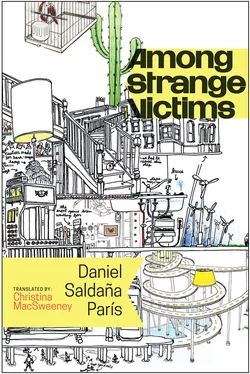He paused in his unspoken mental monologue. Micaela was breathing more quickly, or perhaps he was excited by her closeness and was projecting an image of desire onto her. He was afraid the hypnosis session would start too soon — though at the same time, he longed for the strange taste of Micaela’s urine and the fleeting glimpse, too short to fix itself in his memory, of her Mount of Venus, her panties lying around her diminutive feet.
Micaela was looking at him strangely, as if she had intuited or even heard, by telepathic means, Rodrigo’s reply. The three older men, sitting, as on the previous occasion, in their respective Acapulco chairs, continued bragging while Micaela and Rodrigo lay, perhaps too close, on the matting at their feet. Suddenly, Jimmie interrupted the conversation to announce it was time to commence the ritual: they had drunk enough.
Mechanically, they did the preparatory exercises, the calisthenics, following Jimmie’s lead. After that, in betrayal of the men’s hopes, Micaela shut herself in the bathroom with a jar and, out of the sight, if not the attentive hearing of the other four, took a long, uninterrupted piss. She came out, triumphal, with the brew ready and handed it to Jimmie, who ceremoniously poured it into the four shot glasses with their two fingers of tequila. They drank.
The objects given to them on this occasion were different, less significant, more neutral. Jimmie briefly explained that he didn’t want to direct the course of the hypnosis in too specific a direction. Rodrigo received a lump of some sort of malleable clay or Play-Doh that made him think of the famous piece of Cartesian wax. He remembered the story of the philosopher, learned in his school days and returned to later with, by then, adult curiosity.
In his search for a truth on which to erect the solid edifice of his science, Descartes systematically discarded (the wordplay is intentional) less reliable sources of knowledge. And among those less reliable sources of knowledge, it is always said, are the senses. But the reliability of the senses can only be questioned by means of examples, that is to say stories, inventions, narrative. The zero degree, or almost, of narrative, but narrative nonetheless. The character of Descartes takes a piece of wax and describes it. He enumerates its physical attributes, its shape, its weight, its color. He cannot doubt what he perceives: he knows the piece of wax with apodictic certainty, or so he believes. A second character (little more than a hand, a neutral voice, a blurred face, a shadow acting as the agent of destiny) takes the piece of wax from the first character and, hiding it from sight, puts it close to the stove. Under the effect of the heat, the wax softens, and the second character molds it and evenly divides it into new fragments. Finally, he gives the first character the result of his operations: the same piece of wax having undergone a change. With it, he also offers a rhetorical question, directed not to the first character (who at this point in the work vanishes, or switches off like an exhausted automaton and ceases to attract our attention) but to the spectator, to the History of Understanding, perhaps: “Can the first character know if this is the same piece of wax? If not, how can the senses be unaware of such a fundamental relationship as the principle of identity, which is not contained in the material attributes of a piece of wax?”
That was, more or less, how Rodrigo remembered it. That was how he recreated it as the clay transformed into a worm in his hands. Following the channel of his thoughts, while he fell deeper and deeper into a hypnotic trance and the world around him faded away, he recalled or began to recall the theory, or rather the example of the evil genius. Descartes let his imagination range too freely with that example, that inkling of a plot. There are some truths, like mathematics, that seem to us impossible to doubt. In order to doubt them and stand alone, triumphant, before the void, Descartes proposes the most delicious theory in the history of philosophy: we have been created by a god who obliges us to be mistaken. An evil genius who is amused by our blunders and laughs at the certainty we assign to the simplest sums. An astute god with the worst of intentions, who made us in the form of his boredom to see us fall into error as Thales of Miletus falls into a well. A god who sows signs in things and sends us out into the world with our faces covered in eyes to search for those signs and be dazzled by our stupid discovery. A bastard of a god, like those in myths that have a better sense of humor than the religious ones.
Rodrigo raised his eyes, forcing himself to defer his reflections, and the shock was so complete that he thought he had lost his wits. He was no longer in Jimmie’s workshop, sitting on the floor next to Micaela, but in his bedroom in the apartment in Mexico City. The bed was made, but the creases in the bedspread — Cecilia’s tiger-striped bedspread — showed evidence of a recent presence. As it seemed impossible to attribute to hypnosis this perfect, detailed recreation of his room, Rodrigo assumed he had fallen asleep and even allowed himself to quietly deride Jimmie, Velásquez, and Marcelo for believing in such an absurd project as the future of art. He didn’t deride Micaela because it wasn’t her conviction that had brought her there, but an irreversible series of events, circumstances somewhere between cruel and ridiculous that made up her distant, melancholy personality.
He decided, since he was there, to enjoy his dream and inhabit that lost moment from the past while he could. He didn’t usually struggle against subconscious promptings, and this would be no exception: he was going to live this dream as if he had gone back in time to those days of unemployment and idleness next to the waste ground.
When he remembered the vacant lot, he naturally decided to look for the hen, his feathered accomplice, who would cluck in the dream as in reality, happily feeding on bugs and seeds. He went to the window and leaned out to get a better view. He saw the hen, walking in her characteristic way among the bushes, and he congratulated himself on the veracity and level of detail of his dream, which was representing the undergrowth and the chiaroscuro of the lot like a photograph. But behind the hen he saw something else: a movement of leaves, a cracking of branches, a glimpse of clothing moving a few yards away. Rodrigo leaned back slightly to avoid being seen, but it was unnecessary: the man who was walking around the lot in search of his feathered friend was himself. He saw him moving thorny branches aside and steadying himself by pushing his foot into the earth to get to the bird. He saw, in a flash of sunlight, his face in profile, in the way mirrors never show it and we are surprised to recognize in photographs. He felt dizzy.
He moved farther away from the window and, letting himself fall backwards onto the tiger-striped bedspread, felt a drop of sweat trickling down from his armpit toward his elbow, and a kind of nausea that made him press his hands to his stomach. As if in a revelation of a mystical nature, he suddenly understood what was happening. He didn’t even struggle against it. He opened his eyes in a gesture of fright in the face of the incomprehensible, but each of his following actions seemed self-evident, without the least need for explanation or exegesis. He stood on the bed, lowered his pants and briefs, the elastic of which stretched over his ankles, then he squatted down and produced a perfect turd in the exact center of the tiger-striped bedspread. He didn’t bother to wipe himself: he raised his pants, jumped off the bed, and contemplated his work. It was, without a shadow of a doubt, the same turd. That turd.
He contemplated it in ecstasy during what could have been a long moment: his perception of time was suddenly as malleable as the piece of Cartesian wax. He thought of — or rather imagined in fast-forward — all the events that had occurred since that day, since he came back from the lot with a pain in the back of his head and was disgusted to find that surprise. In some way, he said to himself, his journey toward abandonment, his perdition, his voyage around the void had begun right there. Or before, perhaps: the first time he decided to walk home from work instead of taking the metro. Or even earlier, when he first entered his childhood Thicket, the one this other vacant lot replicated. Or never, and the milestone didn’t exist, just constancy, atoms falling in the void in perfect verticals and monotony.
Читать дальше









